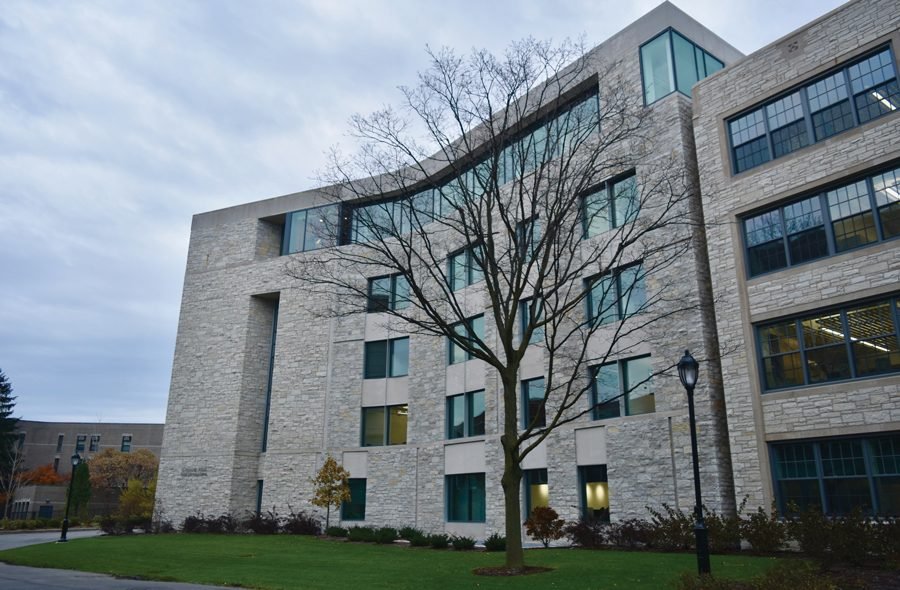Black students discuss undergraduate experience, University demonstration policy
Daily file photo by Brian Meng
Crowe Hall, home of the African American Studies department. The department announced its plans to pursue a name change at the 50th anniversary celebration Friday.
November 11, 2021
Black Northwestern students discussed diversity within the University’s Black community, administrators’ responses to student activism and the African American Studies department’s role in supporting Black students in a Tuesday panel.
The event, “On Being Black at Northwestern,” was part of a yearlong series African American Studies is hosting to mark the department’s 50th anniversary.
African American Studies Prof. Barnor Hesse, who moderated the panel, said the department wanted to focus specifically on the undergraduate experience.
“For at least a decade it’s clear that Black students have a presence at Northwestern often in a protesting way but not really a presence where it’s clearly felt and clearly known what Black students actually think and feel about being Black,” Hesse said.
Communication junior Caleb Whittaker said feeling isolated has defined his experience as a Black student on campus. Whittaker said he was the only Black male resident in his freshman year residence hall, Communications Residential College.
Whittaker also said he often finds he is one of few Black students, if not the only one, in his Radio/Television/Film classes.
“The University does support me in ways, but there’s also a lot of things (that indicate) my existence here was not thought of,” Whittaker said. “At times it feels a lot more isolating than I originally thought, and getting into my junior year, it hasn’t gotten better.”
Weinberg senior Karina Karbo-Wright said they also sometimes feel isolated from other Black students, especially with students’ differing views on activism.
Hundreds of Black students are part of a GroupMe chat and will occasionally discuss activism on campus, Karbo-Wright said. Black student activists have sometimes faced backlash from their peers in this space, she said.
Student activists risk their safety for the benefit of all Black students on campus, Karbo-Wright added.
“It’s sometimes a lot more disappointing to have those conversations (with Black students) explaining that just because you’ve had one good experience with a police officer does not mean that police are operating within the interests of Black people,” they said.
Communication senior Jay Towns said this diversity of thought stems from Black students’ range of backgrounds, such as socioeconomic class.
NU has a high concentration of wealthy students, Towns said, which leads to assumptions of how different students experience Blackness. The range of Black student responses to the abolitionist efforts of NU Community Not Cops have been indicative of these differences, he added.
“I think what’s difficult about a (predominately white institution) like Northwestern is that if you choose to do nothing, then you’re choosing to accept the way that things are, which is just inherently white-facing, white-serving,” Towns said.
As one of three graduating African American Studies majors this year, Karbo-Wright said they think the department could do more to support Black students.
“There is a position the Af-Am department has that they can leverage, and I don’t think we have that right now,” she said.
Last fall, department members released a letter condemning University President Morton Schapiro’s response to student protests for abolition. Other departments then sent letters voicing their support for the African American Studies department’s letter, as opposed to directly supporting Black student protesters, Karbo-Wright said.
In terms of support from administrators, Whittaker said he feels there is a discord between the fact that NU “champions” events like the anniversary of the Bursar’s Office Takeover but will take disciplinary action against student protesters today.
Karbo-Wright added that the demonstration policy is particularly frustrating, given the nationally-ranked work students and professors complete in the African American Studies department.
“You can’t ask us to be scholars and to be intellectual and to be critical and then tell us (to) not be critical of our situation as well,” Karbo-Wright said. “We have the second-best African American Studies Ph.D. program in the country, but it’s like, ‘Okay, y’all need to keep it to the classroom.’”
Email: [email protected]
Twitter: @maiapandey
Related Stories:
— Senior administrators emphasize NU’s demonstration policy following student protest
— African American Studies faculty members send response to Schapiro email
— Karina Karbo-Wright leads social justice education within ASG


